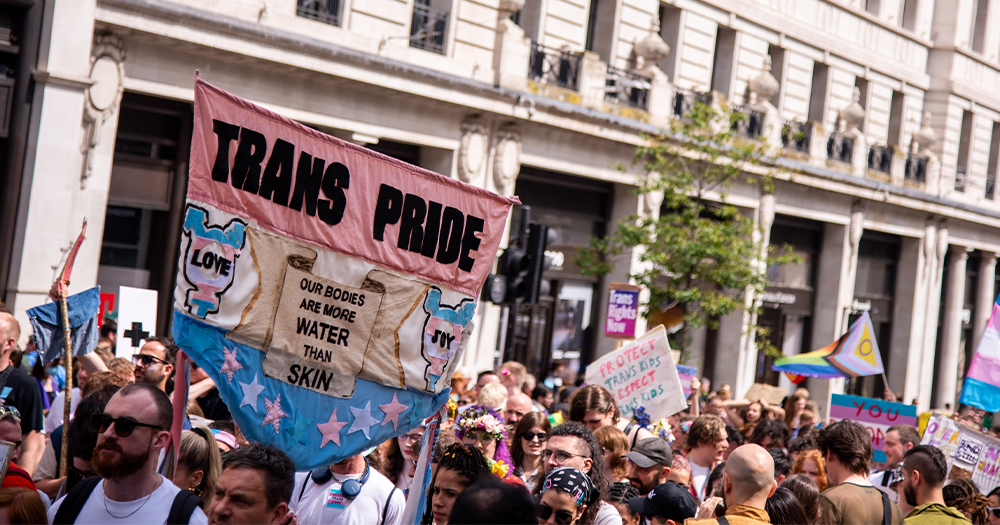With an increasingly hostile environment threatening trans people’s safety, community members become vulnerable to self-policing in order to fly under the radar. Iarfhlaith O’Connell explores why trans people are policing themselves, highlighting the need to push back against oppressive forces, particularly when it comes to artistic expression.
I would be surprised if any queer person reading this was not yet familiar with the work of Ethel Cain but I will offer a quick summary just in case. Ethel Cain is the musical persona of Hayden Silas Horner, a trans woman from Tallahassee who’s 2022 debut album Preacher’s Daughter gained her critical praise and an immediate cult following that has only continued to grow in the two years since its release. The concept album follows the daughter of a Southern minister who attempts to escape her oppressive upbringing by travelling through Western America but who is eventually eaten by a cannibalistic lover. It deals with broad themes such as intergenerational trauma, faith, sexual and religious abuse and ultimately peace and salvation.
Naturally, this has attracted a fan base of queer people who can relate to the emotional consequences of living under religious, or similarly oppressive environments, where experiences of loneliness, isolation and existential pain are bred into those who do not conform to the social order. It was confusing then, that when Cain embarked on her 2024 summer tour complete with a new merch run in anticipation of her next release, that it was so poorly received. While attending one of her London shows in June, my girlfriend, friends and I were amused and intrigued to see that Cain’s new merch mostly consisted of black hats, t-shirts and jumpers that had the word ‘perverts’ scrawled across them.
None of us were particularly shocked at this at the time, as it seemed perfectly in keeping with the irreverence and often dark humour that Cain expresses throughout her music and character. It was only after my girlfriend showed me some of the negative responses the merch had generated online that I even considered there could be an issue with it.
Below is a small selection of comments I have taken from X and Reddit that illustrate the overall problems that people had. These comments and more can be found by simply searching ‘Ethel Cain Perverts Merch’ on either site, for those interested.
“Maybe Ethel will get me out of my habit of buying a t-shirt at every single concert I go to because can you imagine if I ever showed up at uni in these,”
“Girl we’re not walking around in stuff that says pervert.” “Love Hayden and her artistry HOWEVER I simply cannot wear merch that says pervert on it.”
“I can’t believe you just said that all fans of Hayden are perverts AND that it’s okay to be one?? Are you hearing yourself right now?”
“I don’t need my boss or anyone from church or family members or just random women seeing me wearing something that says ‘pervert’ on it lol. I already overthink enough when I’m walking down a road or even an aisle and it’s just me and one woman, I really don’t need a shirt calling me a pervert to add to the paranoia.”
“It’s one thing wearing regular tour merch with dates, a picture of the artist etc but it’s another where something branded with ‘perverts’ can attract unwanted attention. We have to remember that because we know Hayden as an artist and love her art, the broader public do not.”
While I had not initially thought any deeper into the use of ‘perverts’ for her merch, or considered that anyone else would, once I read into these comments it became obvious how this was a micro representation of a much wider cultural problem. You can see that the two core concerns were that wearing the merch would lead to the wearer being perceived by others as a pervert and thus receive unwarranted attention or judgement, or alternatively, they expressed a sense of disgust at the suggestion of being a pervert at all and a total rejection of being associated with the word.
In hindsight, this should not have been surprising to me as I am not a stranger to the claims of perversion, and often subsequently paedophilia, that the current political climate has been using to demonise and ostracise the trans community.
That is not to say that this is a new phenomenon. Queer people have long been labelled as perverts by mainstream society as a means to enact violence against us and disempower our movements towards liberation. One of the contemporary iterations of the word only exists today as a result of modern psychology’s need to pathologise queer people; it became a term used to describe sexualities or sexual behaviours that were considered either harmful to the individual or harmful to society as a whole, as defined by the Collins English Dictionary.
What does still surprise me, however, is the tone and the intention with which many of these criticisms were written. There is of course nothing wrong with not wanting to wear something that you do not feel comfortable in or even fear might put you in danger, but the idea that Cain should not have released this merch in the first place and should censor her own artistic expression due to the ongoing trans hysteria and the personal discomfort of her fanbase is a line of thought that can only lead us further from liberation.
In 1994, Susan Stryker, a prominent figure across multiple fields of trans scholarship, political action and the arts, released an essay titled ‘My Words to Victor Frankenstein Above the Village of Chamounix: Performing Transgender Rage’ in which she discussed the monstrosity of the transgender body and its existence. In this essay, she argued for the transgender reclamation of words such as ‘creature’, ‘monster’ and ‘unnatural’ by writing: “Monstrosity is a gift from the universe that demonstrates an excess outside the normative or the human. I think it’s ungrateful and shortsighted to reject the power of the monstrous. When the cosmos hands it to you, you should use it.”
To me, Ethel Cain’s current use of the word ‘pervert’ is an exact representation of the thought behind Stryker’s statement. In a political climate in which the demonisation and ostracisation of trans people are being escalated daily by false narratives pushed by the various branches of the state apparatus – from religious institutions to politicians, to healthcare providers, all the way down to ‘concerned parents’ – all we as trans people should be doing is embracing and utilising this rejection. To claim the word ‘pervert’ today, to embody the image of the trans pervert that will be placed upon you whether you like it or not, to accept, as Stryker says, the monstrosity of your being, is the only way to understand our agency and emancipate ourselves from the structures that continue to suppress us.
While it is reasonable to fear the ramifications of a life that is not a normative one, the policing of trans art that advocates for this by other trans people for the sake of ascribing to the respectability politics of a society that has only ever worked towards our eradication is not something that we as a community can afford to tolerate.
Ultimately, we don’t all have to wear the merch or make the art but we do have a responsibility to think critically, and more importantly communally, about what we’re engaging with and the serious repercussions that can arise from a refusal to do this.
This article about how increasingly hostile environments are leading to police in the trans community originally appeared in Issue 385 of the GCN Magazine.
© 2024 GCN (Gay Community News). All rights reserved.
This article was published in the print edition Issue No. 385 (August 1, 2024). Click here to read it now.
Support GCN
GCN is a free, vital resource for Ireland’s LGBTQ+ community since 1988.
GCN is a trading name of National LGBT Federation CLG, a registered charity - Charity Number: 20034580.
GCN relies on the generous support of the community and allies to sustain the crucial work that we do. Producing GCN is costly, and, in an industry which has been hugely impacted by rising costs, we need your support to help sustain and grow this vital resource.
Supporting GCN for as little as €1.99 per month will help us continue our work as Ireland’s free, independent LGBTQ+ media.

